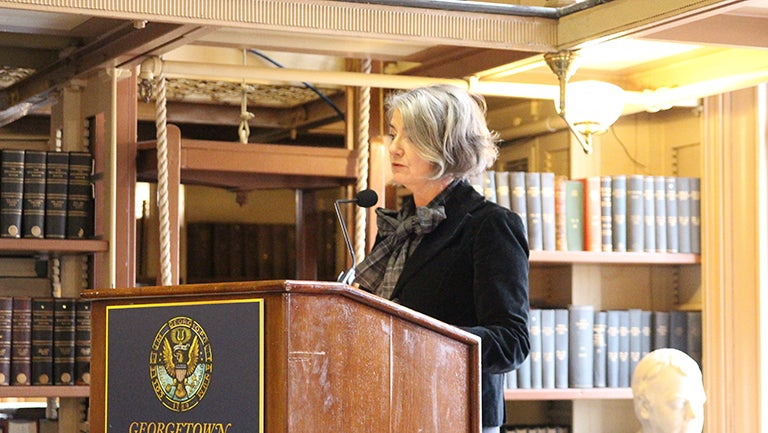Title: Women Peace Builders Underrepresented in Myanmar, Ukraine, Research Shows
New research released this week by the Georgetown Institute for Women, Peace and Security shows that women are sorely underrepresented in peace processes in Myanmar and Ukraine, where violence continues to rage.

As violence continues to rage in Myanmar and Ukraine, new research released this week by the Georgetown Institute for Women, Peace and Security (GIWPS) shows that women are sorely underrepresented in peace processes in both countries.
The real-time study explores alternate strategies women are developing to participate in conflict resolution and peace building.
Former U.S. ambassadors to Ukraine and Myanmar joined the research launch event yesterday on campus, along with Karin Olofsdotter, Sweden’s ambassador to the United States.
The government of Sweden financed the research.
Legitimate and Sustainable
“When women actively participate in peace processes, the outcomes are more legitimate and sustainable,” Olofsdotter said. “The valuable research from GIWPS will support Sweden’s efforts to push women, peace and security during our current two-year membership of the U.N. Security Council.”
Sweden has a feminist foreign policy and seeks research to support rights, representation and resources for women, said Sweden’s first female ambassador to the United States.
Under the direction of Melanne Verveer, former U.S. Ambassador for Global Women’s Issues, GIWPS is committed to promoting a more stable, peaceful and just world by focusing on the important role women play in preventing conflict and building peace.
Largely Excluded
The report released yesterday shows that women are largely excluded from the official, ongoing peace process in Ukraine, which seeks to resolve several years of fighting between Russian-supported separatist rebels and the Ukrainian government.
Women’s civil society organizations in Ukraine, however, have contributed to peace by supporting dialogues to advance reconciliation, providing humanitarian aid and services to areas affected by violence and collecting vital gender-disaggregated data.
“Women’s organizations … the whole civil society sector has come alive,” said William Taylor, U.S. Ambassador to Ukraine between 2006 and 2009, at the launch event.
Women’s groups also have tapped into Ukraine’s desire to integrate into the European Union as a means to gain support for gender equality policies and increased women’s participation, according to the study.
Not Meeting Quota
Ambassador Derek Mitchell, U.S. Ambassador to Myanmar between 2012 and 2016, said women’s participation in the peace process is crucial in the country formerly known as Burma.
“If you’re going to have a nationwide conversation about the future of the country, you need women in there,” he explained.
Home to half a century of armed ethnic conflict, Myanmar has yet to achieve its 30 percent quota for women’s participation in the political dialogue.
Meaningful Participation
Women’s groups in Myanmar have identified alternate ways to build peace, such as serving as conduits between officials and women on the ground.
The women of Myanmar also use international frameworks such as the Convention on the Elimination of All Forms of Discrimination against Women to mobilize support for women’s participation, and leverage gender quotas and personal relationships, the report states.
“If we know what tools are best advancing women’s meaningful participation in peacemaking, such as those represented in the experiences in Myanmar and Ukraine,” Verveer explained, “we can apply these lessons without borders, helping to end conflict and build sustainable peace in other cases.”